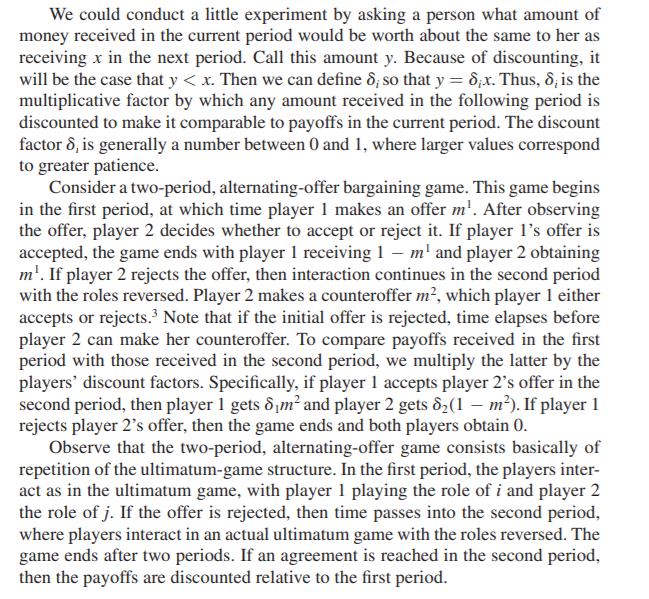Answered step by step
Verified Expert Solution
Question
1 Approved Answer
We could conduct a little experiment by asking a person what amount of money received in the current period would be worth about the

We could conduct a little experiment by asking a person what amount of money received in the current period would be worth about the same to her as receiving x in the next period. Call this amount y. Because of discounting, it will be the case that y < x. Then we can define i so that y = ix. Thus, i is the multiplicative factor by which any amount received in the following period is discounted to make it comparable to payoffs in the current period. The discount factor B, is generally a number between O and l, where larger values correspond to greater patience. Consider a two-period, alternating-offer bargaining game. This game begins in the first period, at which time player I makes an offer mi. After observing the offer, player 2 decides whether to accept or reject it. If player I 's offer is accepted, the game ends with player 1 receiving I mi and player 2 obtaining mi. If player 2 rejects the offer, then interaction continues in the second period with the roles reversed. Player 2 makes a counteroffer m2, which player I either accepts or rejects.3 Note that if the initial offer is rejected, time elapses before player 2 can make her counteroffer. To compare payoffs received in the first period with those received in the second period, we multiply the latter by the players' discount factors. Specifically, if player I accepts player 2's offer in the second period, then player I gets 1m2 and player 2 gets 2(l m2). If player I rejects player 2's offer, then the game ends and both players obtain O. Observe that the two-period, alternating-offer game consists basically of repetition of the ultimatum-game structure. In the first period, the players inter- act as in the ultimatum game, with player I playing the role of i and player 2 the role of j. If the offer is rejected, then time passes into the second period, where players interact in an actual ultimatum game with the roles reversed. The game ends after two periods. If an agreement is reached in the second period, then the payoffs are discounted relative to the first period.
Step by Step Solution
There are 3 Steps involved in it
Step: 1

Get Instant Access to Expert-Tailored Solutions
See step-by-step solutions with expert insights and AI powered tools for academic success
Step: 2

Step: 3

Ace Your Homework with AI
Get the answers you need in no time with our AI-driven, step-by-step assistance
Get Started


